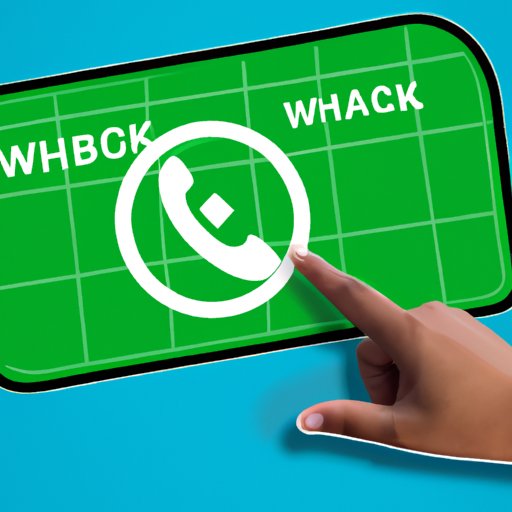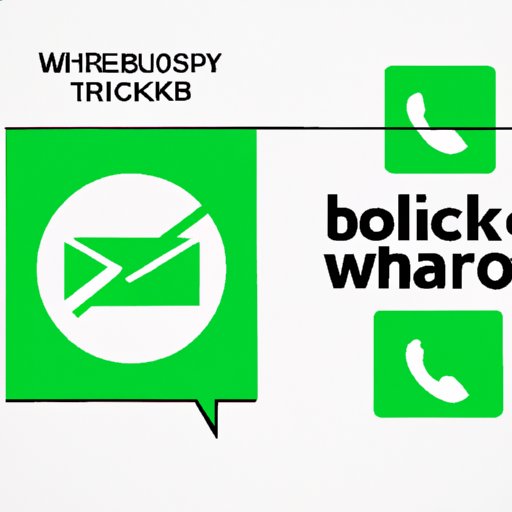
Introduction
WhatsApp has become a ubiquitous communication service, connecting friends, family, and colleagues all over the world. However, there may be times when you need to block someone on WhatsApp due to various reasons such as online harassment, scamming, or spamming. In this article, we will be exploring a step-by-step guide on how to block someone on WhatsApp, as well as why it is necessary to do so. We will also discuss alternative measures to blocking, how to unblock someone, and how to spot if you’ve been blocked.
Step-by-Step Guide on How to Block Someone on WhatsApp
Blocking someone on WhatsApp is a fairly simple process. Here are the steps to follow:
Accessing the Contact List
First, open WhatsApp on your phone and tap on the ‘Chats’ tab. Then, click on the ‘New Chat’ icon at the bottom right corner of the screen.
Selecting the Contact to Block
Next, select the contact that you want to block. If you can’t find their name, try using the search bar at the top of the ‘New Chat’ page.
Confirming the Block
Once you’ve selected the contact, click on their name to view their profile. Scroll down to the bottom of the profile page and click on the ‘Block Contact’ option. Finally, confirm the block by tapping ‘Block’ when prompted by WhatsApp.
Reasons Why Blocking Someone on WhatsApp is Necessary
There are several reasons why you may choose to block someone on WhatsApp:
Online Harassment
Blocking someone who is harassing you online is a necessary measure to protect yourself. Harassment includes any form of unwanted communication or behavior that causes distress or discomfort, such as threatening messages or constant messaging even after you’ve asked them to stop.
Scammers
Online scams have become increasingly common, and WhatsApp is no exception. If you receive messages from someone you don’t know asking for money, personal information, or anything suspicious, it’s best to block them immediately to avoid becoming a victim of a scam.
Spamming
Unwanted and unsolicited messages can be frustrating to deal with. If you’re receiving constant messages from someone you don’t want to hear from, you may choose to block them on WhatsApp.
How to Unblock Someone on WhatsApp
If you’ve blocked someone on WhatsApp and later decide to unblock them, here’s what you need to do:
Accessing the Blocked List
To unblock someone on WhatsApp, you need to access your blocked list. Go to ‘Settings’ and click on ‘Account’, then ‘Privacy’. Scroll down to the bottom of the page and click on ‘Blocked Contacts’.
Selecting the Contact to Unblock
Find the name of the contact you want to unblock on the blocked list, then click on their name to open their profile.
Confirming the Unblock
Finally, click on the ‘Unblock’ option to confirm that you want to unblock the contact. They will be removed from your blocked list and will be able to message you again.
Things to Consider before Blocking Someone on WhatsApp
While blocking may seem like the obvious solution to unwanted communication, there are some things you should consider before doing so:
Ethical Implications
Blocking someone can be seen as a hostile act, so it’s important to consider whether the person deserves to be blocked or if there is an opportunity to resolve the issue first.
Social Implications
If you block someone on WhatsApp who is in your social circle, it may cause tension and awkwardness in group gatherings. Consider whether blocking them is a necessary measure or if there are alternative solutions.
Legal Implications
If you’re blocking someone who is harassing or threatening you, it’s important to document their messages and report them to the authorities if necessary.

Alternatives to Blocking Someone on WhatsApp
If you’re hesitant to block someone on WhatsApp, or if the situation doesn’t warrant a block, there are alternative measures you can take:
Restricting Messages
You can restrict messages from someone on WhatsApp by selecting the chat, clicking on ‘Settings’, then ‘More’, and finally ‘Mute’. This will prevent notifications from the chat, giving you the choice to check in at your own convenience.
Muting Notifications
If you’re receiving too many notifications from someone but don’t want to block them, you can mute individual chats by selecting the chat, clicking on ‘Settings’, then ‘Mute notifications’.
How to Spot if Someone Has Blocked You on WhatsApp
If you’re unsure whether someone has blocked you on WhatsApp, here are some signs to look out for:
Absence of Profile Picture
If you notice that your friend’s profile picture has disappeared, it’s a sign that they may have blocked you.
No Read Receipts
When you send a message to a contact who has blocked you on WhatsApp, you won’t receive a ‘read’ notification, even if they have read the message.
No Last Seen Status
If you can’t see your friend’s last seen status, it’s likely that they have blocked you.
Explaining the Risks of Not Blocking Someone on WhatsApp
If you’re contemplating whether to block someone on WhatsApp or not, it’s important to be aware of the risks of not doing so:
Cyberbullying
Ignoring someone’s messages or harassment can escalate the situation into cyberbullying. It’s important to report and block the person to prevent further harm.
Privacy Infringement
Continued contact from someone who you don’t want to hear from can infringe on your privacy rights. It’s important to take measures to protect yourself.
Unsolicited Messages
Unsolicited messages can be a nuisance and can also put you at risk for scams and other forms of online dangers.
Conclusion
In conclusion, blocking someone on WhatsApp is a necessary measure to protect yourself from online harassment, scams, and spamming. It’s a simple process and can be reversed if necessary. However, it’s important to consider ethical, social, and legal implications before blocking someone. If blocking isn’t necessary, there are alternative measures that can be taken, such as restricting messages and muting notifications. Finally, it’s important to be aware of the signs that someone may have blocked you and the risks of not blocking someone when necessary.
We hope you found this article informative and helpful. If you have any further questions or concerns, please feel free to leave a comment below.




